高考英语高频考点专题
高中英语高考名词性从句高频考点易混点整理(含练习和答案)

高考英语名词性从句高频考点易混点高频考点一:考查that与what的区别在引导名词性从句时,从属连词that一般要注意三个"不":1.不省略。
当从属连词that引导的主语从句位于句首时,that不省略;that引导同位语从句时,一般不省略。
2.不作成分。
that 在名词性从句中不作任何句子成分。
3.无实义。
that 在名词性从句中没有实义。
在引导名词性从句时, what一般要注意一个"不",一个"有词义",一个"作成分":1.不省略。
what 引导名词性从句时,不省略。
2.有词义。
what 引导名词性从句时,有词义。
一般表示"……的东西/事情等",这一用法与that 的用法不一样。
3.作成分。
what 在引导名词性从句时,在从句中充当成分。
这一用法与that 的用法不一样。
例如:Nobody believed his reason for being absent from the class that he had to meet his uncle at the airport.该句中,that引导同位语从句,在句中不作任何成分,不能省略且无词义。
What the teacher said had a good effect on the children.what引导主语从句,在句中有词义。
高频考点二:it放在句首,真正的主语是that从句常用句型如下:① It+系动词+n.+ that从句;② It+系动词+adj.+ that从句;③ It+be+动词的过去分词形式(如said, reported, suggested等)+that从句;④ It+特殊动词(appear, seem, happen, matter, turn out, work out等)+that从句。
高频考点三:考查whether与if的区别whether与if在作"是否"讲时,是可以互换的。
高考英语作文高频考点
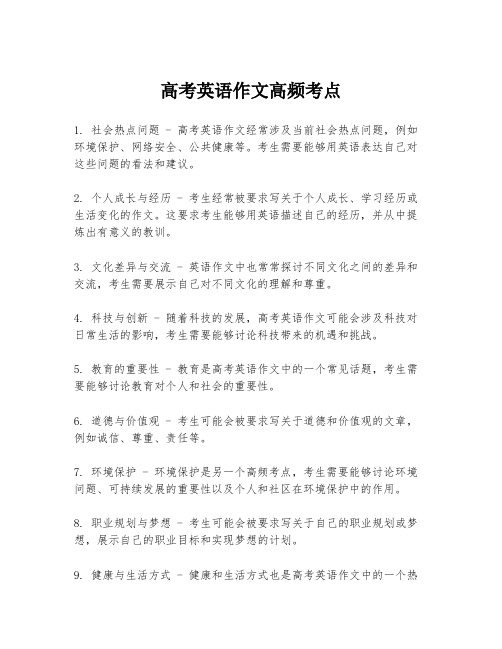
高考英语作文高频考点
1. 社会热点问题 - 高考英语作文经常涉及当前社会热点问题,例如环境保护、网络安全、公共健康等。
考生需要能够用英语表达自己对这些问题的看法和建议。
2. 个人成长与经历 - 考生经常被要求写关于个人成长、学习经历或生活变化的作文。
这要求考生能够用英语描述自己的经历,并从中提炼出有意义的教训。
3. 文化差异与交流 - 英语作文中也常常探讨不同文化之间的差异和交流,考生需要展示自己对不同文化的理解和尊重。
4. 科技与创新 - 随着科技的发展,高考英语作文可能会涉及科技对日常生活的影响,考生需要能够讨论科技带来的机遇和挑战。
5. 教育的重要性 - 教育是高考英语作文中的一个常见话题,考生需要能够讨论教育对个人和社会的重要性。
6. 道德与价值观 - 考生可能会被要求写关于道德和价值观的文章,例如诚信、尊重、责任等。
7. 环境保护 - 环境保护是另一个高频考点,考生需要能够讨论环境问题、可持续发展的重要性以及个人和社区在环境保护中的作用。
8. 职业规划与梦想 - 考生可能会被要求写关于自己的职业规划或梦想,展示自己的职业目标和实现梦想的计划。
9. 健康与生活方式 - 健康和生活方式也是高考英语作文中的一个热
点话题,考生需要能够讨论健康的重要性以及如何保持健康的生活方式。
10. 家庭与人际关系 - 家庭关系和人际关系也是常见的话题,考生需要能够讨论家庭的重要性以及如何建立和维护良好的人际关系。
通过练习这些高频考点,考生可以提高自己的英语写作能力,并在高考英语作文中取得好成绩。
超实用高考英语复习:专题05 高频考点非谓语动词与语法填空(解析版)

距离高考还有一段时间,不少有经验的老师都会提醒考生,愈是临近高考,能否咬紧牙关、学会自我调节,态度是否主动积极,安排是否科学合理,能不能保持良好的心态、以饱满的情绪迎接挑战,其效果往往大不一样。
以下是本人从事10多年教学经验总结出的以下学习资料,希望可以帮助大家提高答题的正确率,希望对你有所帮助,有志者事竟成!养成良好的答题习惯,是决定高考英语成败的决定性因素之一。
做题前,要认真阅读题目要求、题干和选项,并对答案内容作出合理预测;答题时,切忌跟着感觉走,最好按照题目序号来做,不会的或存在疑问的,要做好标记,要善于发现,找到题目的题眼所在,规范答题,书写工整;答题完毕时,要认真检查,查漏补缺,纠正错误。
总之,在最后的复习阶段,学生们不要加大练习量。
在这个时候,学生要尽快找到适合自己的答题方式,最重要的是以平常心去面对考试。
英语最后的复习要树立信心,考试的时候遇到难题要想“别人也难”,遇到容易的则要想“细心审题”。
越到最后,考生越要回归基础,单词最好再梳理一遍,这样有利于提高阅读理解的效率。
另附高考复习方法和考前30天冲刺复习方法。
考点:非谓语动词1、技法巧图解2. 高考真题体验)_________ (strengthen)the connection with young people, the event included a number of public promotional activities on social media.___ ___ (invite) twenty-nine tea professionals from around the world to have thirty-six hours of uninterrupted live broadcasts.【解析】第一空考查非谓语动词。
句意:为了加强与年轻人的联系,活动包括在社交媒体上的一系列公共宣传活动,邀请了来自世界各地的29名茶叶专业人士进行36小时不间断的直播。
高考英语语法知识点总结-(31118)

高考英语高频考点专题专题一定语从句一、关系代词引导的定语从句1、that 指人或物在从句中作主语,宾语或表语which 指物在从句中作主语,宾语或表语(作宾语时可以省略)who 指人在从句中作主语,宾语或表语whom 指人在从句中作宾语whose 指人或物在从句中作定语as 指人或物在从句中作主语,宾语或表语but 指人或物在从句中作主语,宾语或表语注意:指物时,whose+名词=the+名词+of which 或of which+the+名词2、as 的用法(1)常用于下列结构:such…as; so…as;the same…as; as…as注意:the same…as 表示同一类,不同一个the same…that 表示同一个(2)as与which的区别a、位置不同as可放在主句后,主句前或主句中间;which只能放在主句后。
b、as起连接作用,表达说话人的观点、看法,并指出主句内容的根据或出处,意为“正如,正像”。
Which相当于并列句,可以用and this来代替,意为“这一点,这件事’”。
注意:as常用于下列结构:as we know/ as is known to all, as we all can see, as has been said before/above,as might be excepted, as is often the case, 一般不能用which代替as。
C、在从句中作主语时,which既可作系动词be的主语也可作实义动词的主语,而as只可作系动词be的主语。
3、but用作关系代词,相当于who/that…not例:In China there is no one but knows Lei Feng.二、只用that不用which的情况1、.先行词为all , much, everything, nothing , something ,anything, nothing, none, the one等不定代词时2、先行词被only, any, few, little, no , all, just , very ,right等修饰时.3、当先行词是最高级或被形容词最高级修饰时。
高考英语100个高频考点,记住!基础再差也能得分!(20页)
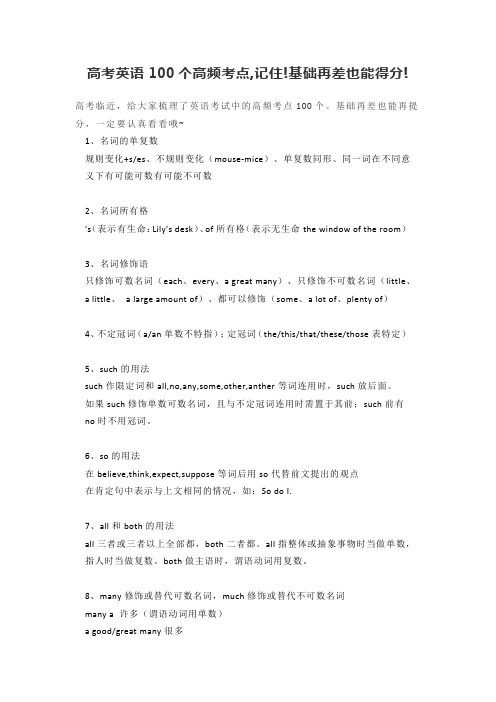
高考英语100个高频考点,记住!基础再差也能得分!高考临近,给大家梳理了英语考试中的高频考点100个。
基础再差也能再提分,一定要认真看看哦~1、名词的单复数规则变化+s/es、不规则变化(mouse-mice)、单复数同形、同一词在不同意义下有可能可数有可能不可数2、名词所有格’s(表示有生命:Lily’s desk)、of所有格(表示无生命the window of the room)3、名词修饰语只修饰可数名词(each、every、a great many)、只修饰不可数名词(little、a little、 a large amount of)、都可以修饰(some、a lot of、plenty of)4、不定冠词(a/an单数不特指);定冠词(the/this/that/these/those表特定)5、such的用法such作限定词和all,no,any,some,other,anther等词连用时,such放后面。
如果such修饰单数可数名词,且与不定冠词连用时需置于其前;such前有no时不用冠词。
6、so的用法在believe,think,expect,suppose等词后用so代替前文提出的观点在肯定句中表示与上文相同的情况,如:So do I.7、all和both的用法all三者或三者以上全部都,both二者都。
all指整体或抽象事物时当做单数,指人时当做复数。
both做主语时,谓语动词用复数。
8、many修饰或替代可数名词,much修饰或替代不可数名词many a 许多(谓语动词用单数)a good/great many很多as many as/as much as一样多、差不多9、little几乎没有,修饰不可数名词a little有一点,修饰不可数名词few几乎没有,修饰可数名词a few有一点,修饰可数名词10、形容词比较级最高级原级比较:…is as good as mine.表示少于或超过另一方:fewer than, mor ethan易混淆短语:as well as也…既…as far as就…而言11、比较级常见错误:用much表强调时的误用She looks more younger than I.(×)She looks much younger than I.(√)12、介词短语重点except for除了in place of代替on behalf of代表but for要不是in front of在…前面13、介词across, over, through, past四个常考介词的区别across 横穿穿越,发生在物体表面over 跨过越过,发生在物体上方through 穿过,发生在某物空间内past 从旁经过14、易混淆的介词短语in all总共after all毕竟at all根本,常用在否定句中表强调above all最重要的是,尤其是15、序数词前一定要加定冠词the,改错常考,序数词与基数词连用时,序数词放在前面,如the first one。
英语高考介词高频考点
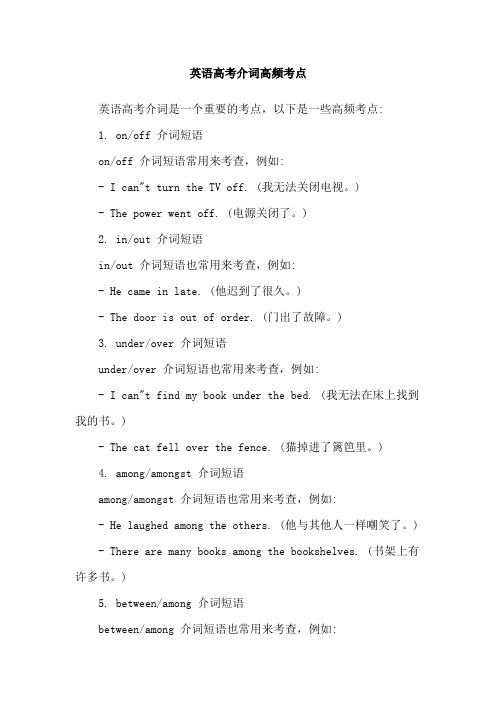
英语高考介词高频考点英语高考介词是一个重要的考点,以下是一些高频考点:1. on/off 介词短语on/off 介词短语常用来考查,例如:- I can"t turn the TV off. (我无法关闭电视。
)- The power went off. (电源关闭了。
)2. in/out 介词短语in/out 介词短语也常用来考查,例如:- He came in late. (他迟到了很久。
)- The door is out of order. (门出了故障。
)3. under/over 介词短语under/over 介词短语也常用来考查,例如:- I can"t find my book under the bed. (我无法在床上找到我的书。
)- The cat fell over the fence. (猫掉进了篱笆里。
)4. among/amongst 介词短语among/amongst 介词短语也常用来考查,例如:- He laughed among the others. (他与其他人一样嘲笑了。
) - There are many books among the bookshelves. (书架上有许多书。
)5. between/among 介词短语between/among 介词短语也常用来考查,例如:- I can"t find my keys between the sofa and the wall. (我无法在沙发和墙上找到我的钥匙。
)- The children played happily among the flowers. (孩子们在花丛中玩得很开心。
)这些介词短语在英语高考中常常会出现,考生需要熟练掌握它们的含义和用法,以便在考试中更好地应对。
高考英语学科高频考点单选题30题
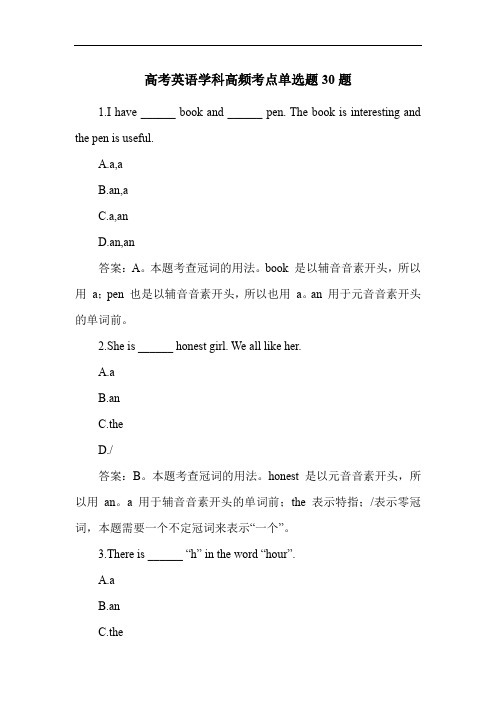
高考英语学科高频考点单选题30题1.I have ______ book and ______ pen. The book is interesting and the pen is useful.A.a,aB.an,aC.a,anD.an,an答案:A。
本题考查冠词的用法。
book 是以辅音音素开头,所以用a;pen 也是以辅音音素开头,所以也用a。
an 用于元音音素开头的单词前。
2.She is ______ honest girl. We all like her.A.aB.anC.theD./答案:B。
本题考查冠词的用法。
honest 是以元音音素开头,所以用an。
a 用于辅音音素开头的单词前;the 表示特指;/表示零冠词,本题需要一个不定冠词来表示“一个”。
3.There is ______ “h” in the word “hour”.A.aB.anC.theD./答案:B。
本题考查冠词的用法。
“h”虽然是辅音字母,但是它的发音是/eɪtʃ/,是以元音音素开头,所以用an。
a 用于辅音音素开头的单词前;the 表示特指;/表示零冠词,本题需要一个不定冠词来表示“一个”。
4.I like playing ______ basketball. He likes playing ______ piano.A.the,theB./,theC.the,/D./,/答案:B。
本题考查冠词的用法。
play basketball 是固定搭配,中间不加冠词;play the piano 也是固定搭配,乐器前面要加the。
5.We have three meals ______ day.A.aB.anC.theD./答案:A。
本题考查冠词的用法。
a day 表示“一天”,是固定用法。
an 用于元音音素开头的单词前;the 表示特指;/表示零冠词,本题需要一个不定冠词来表示“一个”。
6. She is ______ beautiful girl.A. a extremelyB. an extremelyC. extremely aD. extremely an答案:B。
高考英语语法知识点总结

高考英语语法知识点总结高考英语高频考点专题专题一定语从句一、关系代词引导的定语从句1、that 指人或物在从句中作主语,宾语或表语which 指物在从句中作主语,宾语或表语(作宾语时可以省略)who 指人在从句中作主语,宾语或表语whom 指人在从句中作宾语whose 指人或物在从句中作定语as 指人或物在从句中作主语,宾语或表语but 指人或物在从句中作主语,宾语或表语注意:指物时,whose+名词=the+名词+of which 或of which+the+名词2、as 的用法(1)常用于下列结构:such…as; so…as;the same…as; as…as注意:the same…as 表示同一类,不同一个the same…that 表示同一个(2)as与which的区别a、位置不同as可放在主句后,主句前或主句中间;which只能放在主句后。
b、as起连接作用,表达说话人的观点、看法,并指出主句内容的根据或出处,意为“正如,正像”。
Which相当于并列句,可以用and this来代替,意为“这一点,这件事’”。
注意:as常用于下列结构:as we know/ as is known to all, as we all can see, as has been said before/above,as might be excepted, as is often the case, 一般不能用which代替as。
C、在从句中作主语时,which既可作系动词be的主语也可作实义动词的主语,而as只可作系动词be的主语。
3、but用作关系代词,相当于who/that…not例:In China there is no one but knows Lei Feng.二、只用that不用which的情况1、.先行词为all , much, everything, nothing , something ,anything, nothing, none, the one等不定代词时2、先行词被only, any, few, little, no , all, just , very ,right等修饰时.3、当先行词是最高级或被形容词最高级修饰时。
高考英语必备高频考点整理

1.接不定式而不接动名词作宾语的24个常用动词afford to do sth. 负担得起做某事agree to do sth. 同意做某事arrange to do sth.安排做某事ask to do sth. 要求做某事beg to do sth. 请求做某事care to do sth. 想要做某事choose to do sth. 决定做某事decide to do sth. 决定做某事demand to do sth. 要求做某事determine to do sth. 决心做某事expect to do sth. 期待做某事fear to do sth. 害怕做某事help to do sth. 帮助做某事hope to do sth. 希望做某事learn to do sth. 学习做某事manage to do sth. 设法做某事offer to do sth. 主动提出做某事plan to do sth. 计划做某事prepare to do sth. 准备做某事pretend to do sth. 假装做某事promise to do sth. 答应做某事refuse to do sth. 拒绝做某事want to do sth. 想要做某事wish to do sth. 希望做某事注:有些不及物动词后习惯上也接不定式,不接动名词:aim to do sth. 打算做某事fail to do sth. 未能做某事long to do sth. 渴望做某事happen to do sth. 碰巧做某事hesitate to do sth. 犹豫做某事struggle to do sth. 努力做某事2.接不定式作宾补的36个常用动词advise sb. to do sth. 建议某人做某事allow sb. to do sth. 允许某人做某事ask sb. to do sth.请叫某人做某事bear sb. to do sth.忍受某人做某事beg sb. to do sth. 请求某人做某事cause sb. to do sth. 导致某人做某事command sb. to do sth. 命令某人做某事drive sb. to do sth. 驱使某人做某事elect sb. to do sth. 选举某人做某事encourage sb. to do sth. 鼓励某人做某事expect sb. to do sth. 期望某人做某事force sb. to do sth. 强迫某人做某事get sb. to do sth. 使要某人做某事hate sb. to do sth. 讨厌某人做某事help sb. to do sth. 帮助某人做某事intend sb. to do sth. 打算要某人做某事invite sb. to do sth. 邀请某人做某事leave sb. to do sth. 留下某人做某事like sb. to do sth. 喜欢某人做某事mean sb. to do sth. 打算要某人做某事need sb. to do sth. 需要某人做某事oblige sb. to do sth. 迫使某人做某事order sb. to do sth. 命令某人做某事permit sb. to do sth. 允许某人做某事persuade sb. to do sth. 说服某人做某事prefer sb. to do sth. 宁愿某人做某事request sb. to do sth. 要求某人做某事remind sb. to do sth. 提醒某人做某事teach sb. to do sth. 教某人做某事tell sb. to do sth. 告诉某人做某事train sb. to do sth. 训练某人做某事trouble sb. to do sth. 麻烦某人做某事warn sb. to do sth. 警告某人做某事wish sb. to do sth. 希望某人做某事注意:不要受汉语意思的影响而误用以下动词句型:汉语说:“害怕某人做某事”,但英语不说fear sb. to do sth.;汉语说:“原谅某人做某事”,但英语不说excuse forgive sb. to do sth.;汉语说:“拒绝某人做某事”,但英语不说refuse sb. to do sth.;汉语说:“惩罚某人做某事”,但英语不说punish sb. to do sth.;汉语说:“建议某人做某事”,但英语不说suggest propose sb. to do sth.;汉语说:“赞成某人做某事”,但英语不说approve sb. to do sth.;汉语说:“通知某人做某事”,但英语不说inform sb. to do sth.;汉语说:“欢迎某人做某事”,但英语不说welcome sb. to do sth.;汉语说:“坚持某人做某事”,但英语不说insist persist sb. to do sth.; 汉语说:“希望某人做某事”,但英语不说hope sb. to do sth.;汉语说:“安排某人做某事”,但英语不说arrange sb. to do sth.;汉语说:“要求某人做某事”,但英语不说demand sb. to do sth.;汉语说:“感谢某人做某事”,但英语不说thank sb. to do sth.;汉语说:“祝贺某人做某事”,但英语不说congratulate sb. to do sth.; 汉语说:“阻止某人做某事”,但英语不说prevent sb. to do sth.;要表示以上意思,可换用其他表达:汉语的“原谅某人做某事”,英语可说成excuse forgive sb. for doing sth.;汉语的“希望某人做某事”,英语可说成wish sb. to do sth.;汉语的“建议某人做某事”,英语可说成advise sb. to do sth.;汉语的“安排某人做某事”,英语可说成arrange for sb. to do sth.; 汉语的“要求某人做某事”,英语可说成demand of sb. to do sth.; 汉语的“感谢某人做某事”,英语可说成thank sb. for doing sth.;汉语的“祝贺某人做某事”,英语可说成congratulate sb. on sth.;汉语的“阻止某人做某事”,英语可说成prevent sb. from doing sth.;3.接动名词不接不定式作宾语的34个常用动词admit doing sth. 承认做某事advise doing sth. 建议做某事allow doing sth. 允许做某事appreciate doing sth. 感激做某事avoid doing sth. 避免做某事consider doing sth. 考虑做某事delay doing sth. 推迟做某事deny doing sth. 否认做某事discuss doing sth. 讨论做某事dislike doing sth. 不喜欢做某事enjoy doing sth. 喜爱做某事escape doing sth. 逃脱做某事excuse doing sth. 原谅做某事fancy doing sth. 想要做某事finish doing sth. 完成做某事forbid doing sth. 禁止做某事forgive doing sth. 原谅做某事give up doing sth. 放弃做某事imagine doing sth. 想象做某事keep doing sth. 保持做某事mention doing sth. 提及做某事mind doing sth. 介意做某事miss doing sth. 错过做某事pardon doing sth. 原谅做某事permit doing sth. 允许做某事practice doing sth. 练习做某事prevent doing sth. 阻止做某事prohibit doing sth. 禁止做某事put off doing sth. 推迟做某事report doing sth. 报告做某事risk doing sth. 冒险做某事stop doing sth. 停止做某事suggest doing sth. 建议做某事understand doing sth. 理解做某事4.接现在分词作宾补的20个常用动词bring sb. doing sth.引起某人做某事catch sb. doing sth. 碰上撞上某人做某事discover sb. doing sth. 发现某人做某事feel sb. doing sth. 感觉某人做某事find sb. doing sth. 碰上撞上某人做某事get sb. doing sth. 使某人做某事have sb. doing sth. 使某人做某事hear sb. doing sth. 听见某人做某事keep sb. doing sth. 使某人不停地做某事listen to sb. doing sth. 听某人做某事look at sb. doing sth. 看着某人做某事notice sb. doing sth. 注意到某人做某事observe sb. doing sth. 观察某人做某事prevent sb. doing sth. 阻止某人做某事see sb. doing sth. 看见某人做某事send sb. doing sth.使某人突然做某事set sb. doing sth. 使引起某人做某事start sb. doing sth. 使某人开始做某事stop sb. doing sth. 阻止某人做某事watch sb. doing sth. 观察某人做某事5.接动词原形作宾补的11个常用动词feel sb. do sth. 感觉某人做某事have sb. do sth. 使某人做某事hear sb. do sth. 听见某人做某事let sb. do sth.让某人做某事listen to sb. do sth. 听着某人做某事look at sb. do sth. 看着某人做某事make sb. do sth. 使某人做某事notice sb. do sth. 注意某人做某事observe sb. do sth. 观察某人做某事see sb. do sth. 看见某人做某事watch sb. do sth. 观察某人做某事6.接不定式或动名词作宾语意思相同的12个动词like to do sth / like doing sth. 喜欢做某事love to do sth / love doing sth. 喜欢做某事hate to do sth / hate doing sth. 憎恨做某事prefer to do sth / prefer doing sth. 宁可做某事begin to do sth / begin doing sth. 开始做某事start to do sth / start doing sth. 开始做某事continue to do sth / continue doing sth. 继续做某事can’t bear to do sth / can’t bear doing sth. 不能忍受做某事bother to do sth / bother doing sth. 麻烦做某事intend to do sth / intend doing sth.想要做某事attempt to do sth / attempt doing sth. 试图做某事cease to do sth / cease doing sth. 停止做某事7.接不定式或动名词作宾语意思不同的7个动词1 remember to do sth. 记住要做某事remember doing sth. 记住曾做过某事2 forget to do sth. 忘记要做某事forget doing sth. 忘记曾做过某事3 regret to do sth. 后悔遗憾要做某事regret doing sth. 后悔遗憾曾做过某事4 try to do sth. 设法要做某事try doing sth. 做某事试试看有何效果5 mean to do sth. 打算做某事mean doing sth. 意味着做某事6 can’t help to do sth. 不能帮助做某事can’t help doing sth. 禁不住做某事7 go on to do sth. 做完某事后接着做另一事go on doing sth. 继续做一直在做的事注意:stop to do sth. 与stop doing sth.也不同,前者指停下来去做某事,后者指停止正在做的事,但stop to do sth. 中的不定式不是宾语,是目的状语;8.可接双宾语的38个常用动词1 双宾语易位时需借助介词to的常用动词award sb. sth. = award sth. to sb. 颁奖给某人bring sb. sth. = bring sth. to sb. 把某物带给某人hand sb. sth. =hand sth. to sb. 把某物递给某人lend sb. sth. = lend sth. to sb. 把某物借给某人mail sb. sth. = mail sth. to sb. 把某物寄给某人offer sb. sth. = offer sth. to sb. 将某物给某人owe sb. sth. = owe sth. to sb. 把……归功于某人;欠某人某物pass sb. sth. = pass sth. to sb. 把某物递给某人pay sb. sth. = pay sth. to sb. 付给某人某物钱post sb. sth. = post sth. to sb. 把某物寄给某人read sb. sth. = read sth. to sb. 把某物读给某人听return sb. sth. = return sth. to sb. 把某物还给某人send sb. sth. = send sth. to sb. 把某物送给某人sell sb. sth. = sell sth. to sb. 把某物卖给某人serve sb. sth. = serve sth. to sb. 拿某物招待某人show sb. sth. = show sth. to sb. 拿某物给某人看take sb. sth. = take sth. to sb. 把某物拿给某人teach sb. sth. = teach sth. to sb. 教某人某物tell sb. sth. = tell sth. to sb. 告诉某人某情况throw sb. sth. = throw sth. to sb. 把某物扔给某人write sb. sth. = write sth. to sb. 给某人写信2 双宾语易位时需借助介词for的常用动词book sb. sth. = book sth. for sb. 为某人预定某物buy sb. sth. = buy sth. for sb. 为某人买某物choose sb. sth. = choose sth. for sb. 为某人选某物cook sb. sth. = cook sth. for sb. 为某人煮某物draw sb. sth. = draw sth. for sb. 为某人画某物fetch sb. sth. = fetch sth. for sb. 为某人去取某物find sb. sth. = find sth. for sb. 为某人找到某物fix sb. sth. = fix sth. for sb. 为某人准备某物get sb. sth. = get sth. for sb. 为某人拿来某物make sb. sth. = make sth. for sb. 为某人做某物order sb. sth. = order sth. for sb. 为某人订购某物pick sb. sth. = pick sth. for sb. 为某人采摘某物prepare sb. sth. = prepare sth. for sb. 为某人准备某物save sb. sth. = save sth. for sb. 为某人留某物sing sb. sth. = sing sth. for sb. 为某人唱某物歌spare sb. sth. = spare sth. for sb. 为某人让出某物steal sb. sth. = steal sth. for sb. 为某人偷某物注意:有的动词后接的双宾语易位时,既可用介词to引出间接宾语,也可用介词for引出间接宾语,含义相同,如bring,play等:Bring me today’s paper. = Bring today’s paper to for me. 把今天的报纸拿给我;He played us the record he had just bought. = He played the record he had just bought for to us. 他放了他刚买的唱片给我们听;有的动词后接的双宾语易位时,既可用介词to引出间接宾语,也可用介词for引出间接宾语,含义不同,如leave等:They left me no food. = They left no food for me. 他们没给我留一点食物;My uncle left me a large fortune. = My uncle left a large fortune to me.我叔叔死后留下一大笔财产给我;而有的动词后接双宾语时,既不能用介词to引出间接宾语,也不能用介词for引出间接宾语,如allow, ask, cause, charge, cost, forgive, refuse等:He allows his son too much money. 他给他儿子的钱太多;He asked me some questions. 他问了我一些问题;This caused me much trouble. 这给我带来了许多麻烦;He charged me five dollars for a cup of tea. 他一杯茶向我要了5美元;His mistake cost him his job. 他的错误让他丢了工作;I envy you your good luck. 我羡慕你的好运;They forgave him his rudeness. 他们原谅了他的鲁莽;He refused her nothing. 她要什么他就给什么;9.可用于“动词+sb+of sth”的8个常见动词accuse sb. of sth. 控告某人犯某事罪,指责某人做某事cheat sb. of sth. 骗取某人某物cure sb. of sth. 治好某人的病,改掉某人的坏习惯inform sb. of sth. 通知某人某情况事remind sb. of sth. 使某人想起某情况事rid sb. of sth. 使某人摆脱某物rob sb. of sth. 抢劫某人的某东西warn sb. of sth. 警告某人有某情况10.可用于“动词+sb+for doing sth”的8个常见动词blame sb. for doing sth. 指责某人做某事criticize sb. for doing sth. 批评某人做某事forgive sb. for doing sth. 原谅某人做某事excuse sb. for doing sth. 原谅某人做某事pardon sb. for doing sth. 原谅某人做某事punish sb. for doing sth. 惩罚某人做某事scold sb. for doing sth. 指责责备某人做某事thank sb. for doing sth. 感谢某人做某事11.可用于“动词+sb+into doing sth”的9个常见动词cheat sb. into doing sth. 欺骗某人做某事trick sb. into doing sth. 欺骗某人做某事fool sb. into doing sth. 欺骗某人做某事force sb. into doing sth. 迫使某人做某事argue sb. into doing sth. 说服某人做某事talk sb. into doing sth. 说服某人做某事terrify sb. into doing sth. 威胁某人做某事frighten sb. into doing sth. 吓唬某人做某事persuade sb. into doing sth. 说服某人做某事12.容易误用作及物动词的9个不及物动词误:deal a problem正:deal with a problem 处理问题误:depend sb.正:depend on sb. 依靠依赖某人误:insist doing sth.正:insist on doing sth. 坚持要做某事误:knock the door正:knock on at the door 敲门误:operate sb.正:operate on sb. 为某人做手术误:participate sth.正:participate in sth. 参加某事误:refer sth.正:refer to sth. 查阅参考某物误:rely sb. / sth.正:rely on sb. / sth. 依靠依赖某人某物误:reply a letter正:reply to a letter 回信注意:在某些其他用法中,以上有的动词也可能及物,如insist, reply 等动词后可接宾语从句,operate表示“操作”、“管理”等时则及物;13.容易误用作不及物动词的8个及物动词误:serve for sb.正:serve sb. 为某人服务误:marry with sb.正:marry sb. 与某人结婚误:discuss about sth.正:discuss sth. 讨论某事误:mention about sth.正:mention sth. 提到某事误:enter into a room正:enter a room 进入房间误:contact with sb.正:contact sb. 与某人联系误:equal to sth.正:equal sth. 等于某物误:ring to sb.正:ring sb. 给某人打注意:有个别词在用于其他意义时,可以是不及物的,如enter into可以表示开始进入或从事某一状态或活动,或用于较抽象的概念;如:The country entered into a state of war. 这个国家进入战争状态;I can enter into your feelings at the loss of your father. 我理解你失去父亲后的心情;The two old men entered into a long conversation. 两位老人开始长谈起来;14. 17个常用“be+形容词+about”结构be angry about 为……生气be anxious about 为……担忧be careful about 当心……be certain about 确信……be curious about 对……好奇be disappointed about 对……失望be excited about 对……感到兴奋be glad about 对……感到高兴be happy about 为……感到高兴be hopeful about 对……抱有希望be mad about 对……入迷be nervous about 为……感到不安be particular about 对……讲究be sad about 为……而难过be serious about 对……认真be sure about 对……有把握be worried about 为……担忧15. 10个常用“be+形容词+at”结构be angry at 为……生气be bad at 不善于……be clever at 擅长于……be disappointed at 对……失望be expert at 在……方面是内行be good at 善于……be mad at 对……发怒be quick at 在……方面敏捷be skilful at 在……方面熟练be slow at 在……方面迟钝16. 18个常用“be+形容词+for”结构be anxious for 渴望be bad for 对……有害,对……不利be bound for 前往be celebrated for 以……出名be convenient for 对……方便,在……附近be eager for渴望be famous for 因……闻名be fit for 合适,适合be good for 对……有益方便be grateful for 感谢be hungry for 渴望得到be late for 迟到be necessary for 对……有必要be ready for 为……准备好be sorry for 因……抱歉be suitable for 对……合适适宜be thankful for 因……而感激be well-known for以……出名17. 6个常用“be+形容词+from”结构be absent from 缺席,不在be different from 与……不同be far from 离……远,远远不be free from 没有,免受be safe from 没有……的危险be tired from 因……而疲劳18. 13个常用“be+形容词+in”结构be concerned in 与……有关be disappointed in 对某人感到失望be engaged in 从事于,忙于be experienced in 在……方面有经验be expert in 在……方面是行家be fortunate in 在……方面幸运be honest in 在……方面诚实be interested in 对……感兴趣be lack in 缺乏be rich in 富于,在……方面富有be skilful in 擅长于be successful in 在……方面成功be weak in 在……方面不行19. 18个常用“be+形容词+of”结构be afraid of 害怕be ashamed of 为……感到羞愧be aware of 意识到,知道be capable of 能够be careful of 小心,留心be certain of 确信,对……有把握be fond of 喜欢be free of 没有,摆脱be full of 充满be glad of 为……而高兴be nervous of 害怕be proud of 为……自豪be short of 缺乏be shy of 不好意思be sick of 对……厌倦be sure of 肯定,有把握be tired of 对……厌烦be worthy of 值得,配得上20. 20个常用“be+形容词+to”结构be accustomed to 习惯于be blind to 对……视而不见be close to 靠近,接近be cruel to 对……残酷,对……无情be devoted to 献身,专心于be equal to 等于,能胜任be familiar to 为某人所熟悉be harmful to 对……有危害be important to 对……重要be open to 对……开放,易受到be opposed to 反对,不赞成be opposite to 在……对面,和……相反be polite to 对……有礼貌be related to 与……有关是亲戚be respectful to 尊敬be rude to 对……无礼be similar to 与……相似be true to 忠实于,信守be used to 习惯于be useful to 对……有用21. 16个常用“be+形容词+with”结构be angry with 对某人生气be bored with 对……厌烦be busy with 忙于be careful with 小心be concerned with 关于,与……有关be content with 以……为满足be delighted with 对……感到高兴be disappointed with 对某人失望be familiar with 熟悉,精通be honest with 对某人真诚be ill with 患……病be patient with 对某人有耐心be pleased with 对……满意高兴be popular with 受……欢迎be satisfied with 对……满意be strict with 对某人严格22. 24个常用“in+其他词+of”结构in advance of 预先,提前in aid of 帮助in behalf of 为了,为了……的利益in case of 如果,万一,以防in celebration of 庆祝in charge of 负责,管理in commemoration of 纪念,庆祝in defence of 保卫in explanation of 解释in face of 面对in favour of 赞成,主张in front of 在……前面in honor of 纪念,祝贺,欢迎in memory of 纪念in need of 需要in place of 代替in possession of 拥有in praise of 称赞in respect of 关于,就……而言in search of 寻找,搜找in sight of 看得见,在看见……的地方in spite of 虽然,尽管in support of 为了支持拥护……in view of 鉴于,考虑到注意:同时注意一下相似结构:in exchange for 作为对……的交换in preparation for 为……作准备in return for 作为……的报答in reward for 作为……的报酬in addition to 加之,除……之外in answer to 回答,响应in contrast to with 与……形成对比in opposition to 与……相反,反对in reply to 作为对……的回答答复in response to 回答,响应in with reference to 关于in with regard to 关于23. 27个带to doing sth.的常用结构1.动词+介词to+动名词1 admit to doing sth. 承认做了某事2 apply to doing sth. 适用于做某事3 object to doing sth. 反对做某事4 see to doing sth. 负责做某事5 stick to doing sth. 坚持做某事6 take to doing sth. 喜欢上做某事,逐渐习惯做某事2.动词+宾语+介词to+动名词1 apply oneself to doing sth. 专心致力于做某事2 devote sth. to doing sth. 把……献给做某事3 devote oneself to doing sth. 献身于做某事4 limit sth. to doing sth. 把……限制在做某事的范围内5 reduce sb. to doing sth. 使某人沦为做某事3.动词+名词+介词to+动名词1 give one’s life to doing sth. 献身于做某事2 give one’s mind to doing sth. 专心做某事3 have a dislike to doing sth. 厌恶做某事4 have an eye to doing sth. 注意做某事5 have an objection to doing sth. 反对反感做某事6 pay attention to doing sth. 注意做某事7 set one’s mind to doing sth. 决心做某事+形容词+介词to+动名词1 be equal to doing sth. 等于做某事,能胜任做某事2 be used to doing sth. 习惯于做某事3 be opposed to doing sth. 反对做某事4 be reduced to doing sth. 使某人沦为做某事5 be devoted to doing sth. 把时间钱,精力等献给做某事6 be limited to doing sth. 把……限制在做某事的范围内5.其他结构+介词to+动名词1 get down to doing sth. 开始做某事,认真处理某事2 look forward to doing sth. 盼望做某事3 What do you say to doing sth 你认为做某事如何。
高考专题08 及物非及物动词、时态非谓语动词、介词-高考英语十大高频考点---精品解析Word版

高考专题【考点详解】考点一及物非及物动词一、动词之及物不及物(动作完整)二、简单句-五大句型主谓I come主谓宾I miss you主谓宾宾You give me your heart主谓宾宾补You make me happy主系表you are my little apple三、不及物动词误用作及物动词误: deal a problem 正:deal with a problem处理问题误: depend sb. 正:depend on sb. 依靠(依赖)某人误: rely sb./sth. 正:rely on sb./sth.依靠(依赖)某人(某物)误: insist doing sth. 正:insist on doing sth. 坚持要做某事误: knock the door 正:knock at/on the door敲门误: operate sb. 正:operate on sb.为某人做手术误: participate sth. 正:participate in sth.参加某事误: refer sth. 正:refer to sth.查阅(参考)某物误: reply a letter 正:reply to a letter回信注意:在某些其他用法中,以上有的动词也可能及物,如insist, reply等动词后可接宾语从句,operate表示“操作”、“管理”等时则及物及物动词误用作不及物动词四、动词原形-非谓语动词-谓语动词go going, to go, gone goes, went, will go等动词原形非谓语动词谓语动词考点二时态非谓语动词【考点实例】1.The island to the mainland by a bridge, is easy to go to.A joiningB to joinC joinedD having joined2. Sarah pretended to be cheerful nothing about the argument.A saysB saidC to sayD saying3. While (walk)his dog in the park yesterday afternoon, Bob heard someone shouting for help in the distance.4. I am not interested in pop music, because I often have difficulty (understand)the words.【答案】C D walking in understanding【考点精析】一、一般现在时的用法【概念】表示经常性、习惯性的动作或存在的状态。
超实用高考英语复习高频考点+重难点:专题 01 定语从句(名校模拟15练+冲刺高考强化40练)
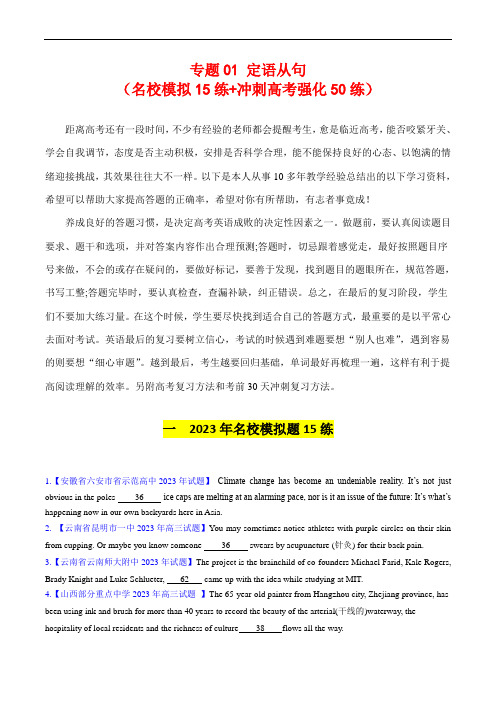
专题01 定语从句(名校模拟15练+冲刺高考强化50练)距离高考还有一段时间,不少有经验的老师都会提醒考生,愈是临近高考,能否咬紧牙关、学会自我调节,态度是否主动积极,安排是否科学合理,能不能保持良好的心态、以饱满的情绪迎接挑战,其效果往往大不一样。
以下是本人从事10多年教学经验总结出的以下学习资料,希望可以帮助大家提高答题的正确率,希望对你有所帮助,有志者事竟成!养成良好的答题习惯,是决定高考英语成败的决定性因素之一。
做题前,要认真阅读题目要求、题干和选项,并对答案内容作出合理预测;答题时,切忌跟着感觉走,最好按照题目序号来做,不会的或存在疑问的,要做好标记,要善于发现,找到题目的题眼所在,规范答题,书写工整;答题完毕时,要认真检查,查漏补缺,纠正错误。
总之,在最后的复习阶段,学生们不要加大练习量。
在这个时候,学生要尽快找到适合自己的答题方式,最重要的是以平常心去面对考试。
英语最后的复习要树立信心,考试的时候遇到难题要想“别人也难”,遇到容易的则要想“细心审题”。
越到最后,考生越要回归基础,单词最好再梳理一遍,这样有利于提高阅读理解的效率。
另附高考复习方法和考前30天冲刺复习方法。
一2023年名校模拟题15练1.【安徽省六安市省示范高中2023年试题】Climate change has become an undeniable reality. It’s not just obvious in the poles ____36____ ice caps are melting at an alarming pace, nor is it an issue of the future: It’s what’s happening now in our own backyards here in Asia.2. 【云南省昆明市一中2023年高三试题】You may sometimes notice athletes with purple circles on their skin from cupping. Or maybe you know someone ____36____ swears by acupuncture (针灸) for their back pain.3.【云南省云南师大附中2023年试题】The project is the brainchild of co-founders Michael Farid, Kale Rogers, Brady Knight and Luke Schlueter, ___62___ came up with the idea while studying at MIT.4.【山西部分重点中学2023年高三试题】The 65-year-old painter from Hangzhou city, Zhejiang province, has been using ink and brush for more than 40 years to record the beauty of the arterial(干线的)waterway, the hospitality of local residents and the richness of culture____38____flows all the way.5.【2023届福建省厦门市高二检试题】The postal service hall is no longer a traditional one, providing a new scene ____37____ citizens can socialize and experience postal culture.6.【2023届广东省广州天河区二模试题】When they say this, they mean that they have already got everything ___39___ are needed and don’t need anything else.7.【2023届河北省衡水中学下学期一调试题】However, a recently launched WeChat miniprogram is allowing every history enthusiast to be a hero in a virtual world, ____40____ one not just climbs the Great Wall, but also protects it.8.【2023届重庆市高三第七次联考质量检测试题】On May 26, 2002, the WHO issued a document_____65_____ called on more than 180 countries to adopt TCM as an alternative in their medical policies.9.【江苏省南通市海安中学2023年高三试题】In contrast to the court life and upper-class culture, ____64____ are represented by the Forbidden City, Summer Palace, and the Temple of Heaven, the hutongs reflect_____65_____ culture of grassroots Beijingers.10.【重庆市巴蜀中学2023年高三下学期试题】The series portrays a fictional world ___44___, in the first book, Earth encounters an alien civilization in a nearby star system that consists of three solar-type stars orbiting each other in an unstable three-body system.11.【安徽皖南八校2022-2023学年高三大联考】But just how does his version differ? It is packed with cheese, ham, pickle (泡菜,腌菜) and black truffle mayonnaise (黑松露蛋黄酱)—ingredients typically found in French crepes (法式薄饼), ____63____ Delcroix says aren’t that different from Chinese pancakes.12.【2023届福建省漳州市二检试题】The traditional process of making Xuan paper by hand is extremely time-consuming and demanding, ____41____ consists of more than 100 steps including collecting, leavening (发酵), whitening, screening, and sunning.13.【2023届湖北省华中师范大学附中二检】The ruins, ____38____ core area covers 14.3 square kilometers in the northwest of Hangzhou, are considered as important representation of early urban civilization, with rice-growing agriculture as the economic foundation.14.【甘肃省定西市三检测英语试题】Your can sit on the _49_ (two) floor, from _50_you can see the city very well. It’s very interesting.15.【辽宁省名校联盟2023年试题】Chen and Peng pass the skills on to their followers, some of ____65____ work in Guangdong and Fujian Provinces as professional mask carvers.二冲刺高考强化50练用单词的适当形式完成句子1.“It doesn’t feel as alone as it may have before all the advances in technology,” said Laurie Demerit,________company provided the statistics for the report.2.In Wickenden’s book, she expanded on the history of the West and also on feminism, ________ of course influenced the girls’ decision to go to Elkhead.3.The Digital World is a set of volumes ________ aim to describe how digital systems influence society and help readers understand the nature of digital systems and their many interacting parts.4.As we explore the world in greater depth, we may reach a point ________ it is impossible to run an experimental scenario in the real world due to physical, ethical or financial limitations.5.That said, to be honest the only people who ever ring our home phone are our Baby Boomers parents, to the point ________we play a game and guess who is calling before we pick up the phone (using Caller ID would take the fun out of it).6.Of those Australians ________ still have a landline, a third concede that it’s not really necessary and they’re keeping it as a security blanket - 19 percent say they never use it while a further 13 percent keep it in case of emergencies.7.I’ve seen those magic moments ________ children are talking to someone they are inspired by their eyes are shining and their faces light up,” she said.8.The very first Federal Duck Stamp was designed by J.N. “Ding” Darling, a political cartoonist from Des Moines, lowa, ________ at that time was appointed by President Franklin Roosevelt as Director of the Bureau of Biological Survey.9.They wore expensive clothes. So for them to move to Elkhead, Colo. to instruct the children ________shoes were held together with string was a surprise.10.Last year it recovered more than 807,500 pounds of food by taking donations and collecting blemished (有瑕疵的) produce ________ otherwise would have rotted in fields.11.New research shows that the average cost of raising a child to the age of 18 in China in 2019 was 485,000 yuan for a first child,________ is far more than that in the United States and Japan.12.Short space trips will develop first, then the space hotels will go around the earth ________it will be possible to have a longer vacation.13.He later set up China’s first draft bank, Rishengchang, ________ later had 35 branches across the co untry. 14.In China, chopsticks are called kuaizi,________is a word made up of characters meaning quick and “bamboo”.15.Our grandma, ________ we called “Nanny”, would always bake bread a day ahead.16.For instance, in Lima, the capital of Peru, there are more than 50 Chinese medicine clinics, about 70 percent of ________ were set up by local doctors.17.In 2006, its average weekly circulation was reported to be 1.5 million copies, half of ________ were sold in the United States.18.When you sleep, your brain sorts through everything ________ happened during the day, trying to link new experiences to old memories.19.She discovered Artemisinin(青蒿素), a drug _________ has significantly reduced the death rates for patients suffering from malaria. “Artemisinin is a gift for the world people from the traditional Chinese medicine. (用适当的词填空)20.Less snow cover in the mountains is important in the West and Alaska, _________ will greatly reduce thechances of disasters caused by too much snow.21.Sanxingdui (三星堆) is believed to have sat at the heart of the Shu state, _________ historians know little about because of the lack of written records.22.Stacey Abrams, ________ served in the House of Representatives in Georgia from 2007 to 2017, is a politician, lawyer and voting rights activist.23.I decided that if I learned of a company__________ used a lot of plastic, I'd send it an email urging it to cut back.24.After greeting her family, Mulan changes back into her female clothing and visits her comrades, ________ are all amazed and confused.25.It was a big deal for us to load up and go to the local library, __________my kids could pick out books to read or books they wanted me to read to them.26.It is our hope that in coming decades, advances in science will offer new perspectives(视角)from__________ to study how people manage their lives.27.China is a country with a time-honored civilization, _________ is quite particular about ceremony and etiquette (礼节) .28.Finally, I ended up leaving the football team. Four other girls did the same, two of _____stopped playing football completely.29.Many other buildings around the world have also been certified by LEED, each of _______ serves a step in the right direction towards a cleaner future.30.People gathered in their gardens ________ they shared hugs and offered words of hope and faith that they would see themselves through it all.31.The artist was very proud of his creation and called it the best painting ________ he had ever done.32.The house, ________ door often stays open until late at night,works as a home for the guards,some of________ are from the countryside.33.However, it is worth bearing in mind _________ wool carpets don’t respond well to stains as they a re highly absorbent and so aren’t suited to areas of the house _________ spillages(溢出) are frequent.34.Therefore, performing the lion dance became a custom ________ people could pray for good luck, safety, and happiness.35.To attract visitors to the coaster, the park has just released (发布) new photos and videos online, ________ show what the coaster will be like from the perspective (视角) of person riding.36.After running a restaurant for several years, he retired at the age of 65 and received his first social security check, ________ was for $105, as his only income.37.The purse contained many gold coins and a note from the king, saying that the gold was for the person________ removed the huge rock from the road.38.In the past few years, more than half of the bookstores in China have closed down, ________ is the result of the competition with online bookstores.39.A robot designed for fun by Indonesian villagers and scientists has found a new use during the COVID-19outbreak. It brings food, and hopefully a smile, to people ________ have been infected (感染).40.Studies have shown that students________ use handwriting to take notes in class remember information better—improving their scores by as much as 15 percent.41.Kim Cobb,a professor at the Georgia Institute of Technology in Atlanta ,is one of a small but growing minority of academics ________ are cutting back on their air travel because of climate change ,Travelling toconferences ,lectures ,workshops,and the like-frequently by plane.42.The Japanese government and Tokyo Electric Power Company (TEPCO), the firm ________ runs the site, have emphasized that the main radionuclide (放射性核) remaining is tritium (氚).43.________ is described in Paragraph 4, taking a small kid to a half-hour Story Time allows the parent to enjoy quiet reading.44.Because of the great increase in rainfall, rivers are full of water, ________ gives rise to great tasting fish and shrimps.45.All kinds of traditional Chinese herbal medicine can be found too, and there are Chinese tea shops, ________ visitors can taste and buy a variety of Chinese tea.46.This is the reason ________ Jennifer and her colleagues have called for a global pause in any clinical application of the CRISPR technology in human embryos to give us time to really consider all of the various results of doing so.st year China's total ticket sales fell a bit short of the North American box office,________ is a healthy showing for China.48.If all goes as planned, Laos will be the first stop on one route of the Pan Asia Railway Network, ________ aim is to connect China with all of Southeast Asia.49.Then,inspired by his baseball coach,T.Williquette,and those ________ were active in charity,he decided to take action and help.50.Meanwhile, they exchange ideas and feelings with each other, through ________ they probably acquire more knowledge.高考质量提升是一项系统工程,涉及到多个方面、各个维度,关键是要抓住重点、以点带面、全面突破,收到事半功高考质量提升是一项系统工程,涉及到多个方面、各个维度,关键是要抓住重点、以点带面、全面突破,收到事半功倍的效果。
高考专题07 动词、延续性动词考察-高考英语十大高频考点详解---精品解析Word版
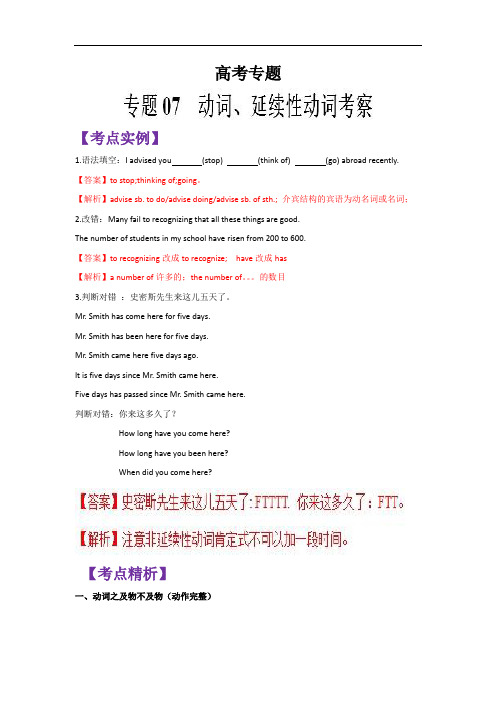
高考专题【考点实例】1.语法填空:I advised you (stop) (think of) (go) abroad recently. 【答案】to stop;thinking of;going。
【解析】advise sb. to do/advise doing/advise sb. of sth.; 介宾结构的宾语为动名词或名词;2.改错:Many fail to recognizing that all these things are good.The number of students in my school have risen from 200 to 600.【答案】to recognizing改成to recognize; have改成has【解析】a number of许多的;the number of。
的数目3.判断对错:史密斯先生来这儿五天了。
Mr. Smith has come here for five days.Mr. Smith has been here for five days.Mr. Smith came here five days ago.It is five days since Mr. Smith came here.Five days has passed since Mr. Smith came here.判断对错:你来这多久了?How long have you come here?How long have you been here?When did you come here?【考点精析】一、动词之及物不及物(动作完整)二、简单句-五大句型主谓I come主谓宾I miss you主谓宾宾You give me your heart主谓宾宾补You make me happy主系表you are my little apple三、不及物动词误用作及物动词误: deal a problem 正:deal with a problem处理问题误: depend sb. 正:depend on sb. 依靠(依赖)某人误: rely sb./sth. 正:rely on sb./sth.依靠(依赖)某人(某物)误: insist doing sth. 正:insist on doing sth. 坚持要做某事误: knock the door 正:knock at/on the door敲门误: operate sb. 正:operate on sb.为某人做手术误: participate sth. 正:participate in sth.参加某事误: refer sth. 正:refer to sth.查阅(参考)某物误: reply a letter 正:reply to a letter回信注意:在某些其他用法中,以上有的动词也可能及物,如insist, reply等动词后可接宾语从句,operate表示“操作”、“管理”等时则及物及物动词误用作不及物动词四、有两个以上动词(动作)的简单句我爱篮球I love basketball. 第1变:变非动词我爱打篮球简单句中的动词+ 动词I love playing basketball.我想去打篮球I want to go to play basketball.五、动词(动作)之延续不延续1.非延续性动词(只限肯定式)表示的动作短暂,不能持续;不可与表示一段时间的状语连用。
高考英语复习专题(共15个专题)

语法复习专题一-—名词一、考点聚焦1。
可数名词单、复数变化形式(1)规则变化.①单数名词词尾直接加—s。
如:boy — boys, pen — pens。
②以s、x 、ch 、sh结尾的单词一般加-es。
如:glass — glasses,box — boxes, watch — watches, brush — brushes.特例:stomach - stomaches.③以“辅音字母 + y"结尾的变“y”为“i"再加“-es”.如:baby - babies, lady - ladies, fly — flies.④以“o"结尾的多数加-es。
如:tomato —tomatoes,potato —potatoes, hero - heroes。
但以两个元音字母结尾的名词和部分外来词中以o 结尾的词只加—s。
如:radio — radios, zoo — zoos, photo - photos,piano - pianos, kilo — kilos, tobacco - tobaccos.⑤以“f”或“fe"结尾的名词复数形式变“f"或“fe”为“v",之后再加-es。
如:wife - wives, life - lives, knife — knives, wolf— wolves, self — selves, leaf - leaves等.特例:handkerchief— handkerchiefs, roof - roofs, chief — chiefs, gulf — gulfs, belief — beliefs, cliff —cliffs。
⑥改变元音字母的.如:man - men, mouse — mice, foot — feet,woman — women, tooth — teeth, goose - geese, ox — oxen.特例:child - children。
高考英语语法专题被动语态高频考点
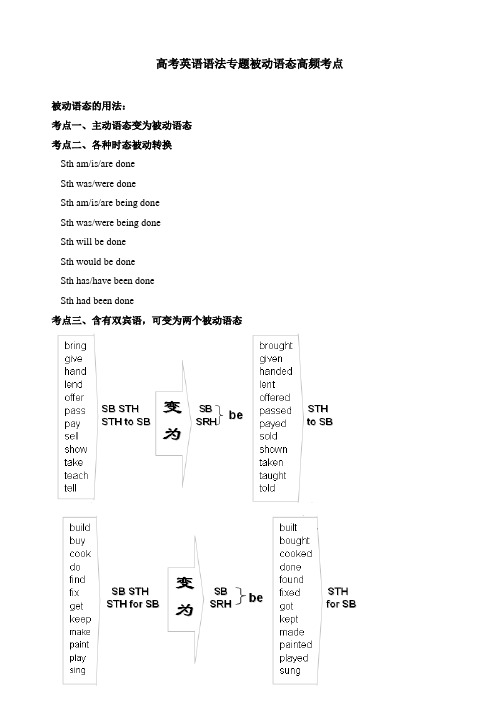
高考英语语法专题被动语态高频考点被动语态的用法:考点一、主动语态变为被动语态考点二、各种时态被动转换Sth am/is/are doneSth was/were doneSth am/is/are being doneSth was/were being doneSth will be doneSth would be doneSth has/have been doneSth had been done考点三、含有双宾语,可变为两个被动语态考点四、含宾补被动构成带宾补的被动语态结构一带宾补的被动语态结构二考点五、短语动词的被动语态1.短语动词的被动语态:短语动词是一个整体,变为被动时不可丢掉后面的介词或副词,通常可以变为两种被动。
例如:We make use of our time to study.①Time is made use of to study.①Use is made of time to study.2.类似的短语动词有Make use of----sth be made use of//use be made ofPlay a role of---sth is played a role of/ a role is played ofPay attention to考点六、表示"据说"或"相信" 的词组基本上由believe, consider, declare, expect, feel , report, say, see, suppose, think, understand 等组成。
例如:It is said that…据说It is reported that… 据报道It is believed that…大家相信It is hoped that…大家希望It is well known that… 众所周知It is thought that…大家认为It is suggested that…据建议It is taken granted that…被视为当然It has been decided that… 大家决定It must be remember that… 务必记住的是考点七、不用被动语态的情况(一)系动词look,sound,taste,smell ,feel,go ,grow无被动(二)不及物动词appear, die ,disappear, end, fail, happen, last, lie, remain, sit, spread, stand 与不及物动词短语break out, come true, fall asleep, keep silence, lose heart, take place等无被动语态.(三)及物动词cost, leave, enter, reach, suit, have, wish, hold, own, lack, fit, resemble, jump, mind也无被动.(四)有些及物的短语动词agree with, arrive at/in, shake hands with, succeed in, suffer from, happen to, walk into, belong to也无被动.(五)宾语是反身代词、相互代词、同源宾语、不定式、v-ing形式及抽象名词等,都不能变为被动句子的主语.考点八、主动形式表示被动意义(一)blame, let, rent(二)在worth时用主动表被动(worthy/worthwhile用法)(三)在need, require, want, deserve doing.主动表被动(四)raise risemiss loseremain leavecome about bring aboutcome up come up withrun out run out ofgo out put outgrow up bring upmake sense make sense of(五)wash, clean, cook, sell, read, wear, draw, write, sell等。
高考英语高频考点100个
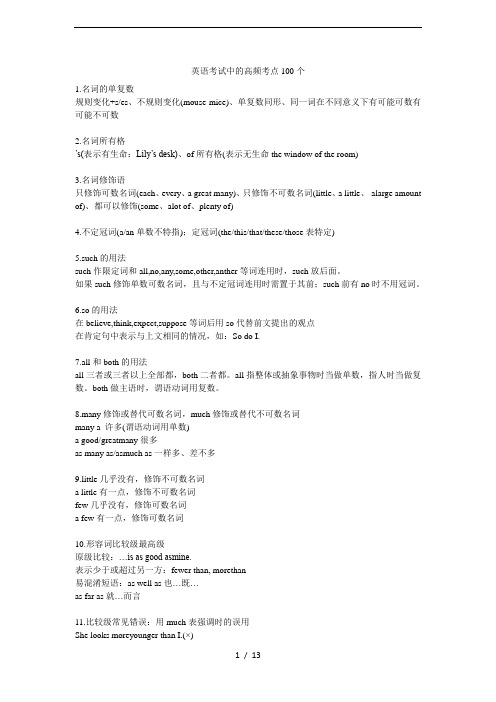
英语考试中的高频考点100个1.名词的单复数规则变化+s/es、不规则变化(mouse-mice)、单复数同形、同一词在不同意义下有可能可数有可能不可数2.名词所有格’s(表示有生命:Lily’s desk)、of所有格(表示无生命the window of the room)3.名词修饰语只修饰可数名词(each、every、a great many)、只修饰不可数名词(little、a little、alarge amount of)、都可以修饰(some、alot of、plenty of)4.不定冠词(a/an单数不特指);定冠词(the/this/that/these/those表特定)5.such的用法such作限定词和all,no,any,some,other,anther等词连用时,such放后面。
如果such修饰单数可数名词,且与不定冠词连用时需置于其前;such前有no时不用冠词。
6.so的用法在believe,think,expect,suppose等词后用so代替前文提出的观点在肯定句中表示与上文相同的情况,如:So do I.7.all和both的用法all三者或三者以上全部都,both二者都。
all指整体或抽象事物时当做单数,指人时当做复数。
both做主语时,谓语动词用复数。
8.many修饰或替代可数名词,much修饰或替代不可数名词many a 许多(谓语动词用单数)a good/greatmany很多as many as/asmuch as一样多、差不多9.little几乎没有,修饰不可数名词a little有一点,修饰不可数名词few几乎没有,修饰可数名词a few有一点,修饰可数名词10.形容词比较级最高级原级比较:…is as good asmine.表示少于或超过另一方:fewer than, morethan易混淆短语:as well as也…既…as far as就…而言11.比较级常见错误:用much表强调时的误用She looks moreyounger than I.(×)She looks muchyounger than I.(√)12.介词短语重点except for除了in place of代替on behalf of代表but for要不是in front of在…前面13.介词across,over,through,past四个常考介词的区别across横穿穿越,发生在物体表面over跨过越过,发生在物体上方through穿过,发生在某物空间内past从旁经过14.易混淆的介词短语in all总共after all毕竟at all根本,常用在否定句中表强调above all最重要的是,尤其是15.序数词前一定要加定冠词the,改错常考,序数词与基数词连用时,序数词放在前面,如the first one。
高中英语考试中的高频考点100个
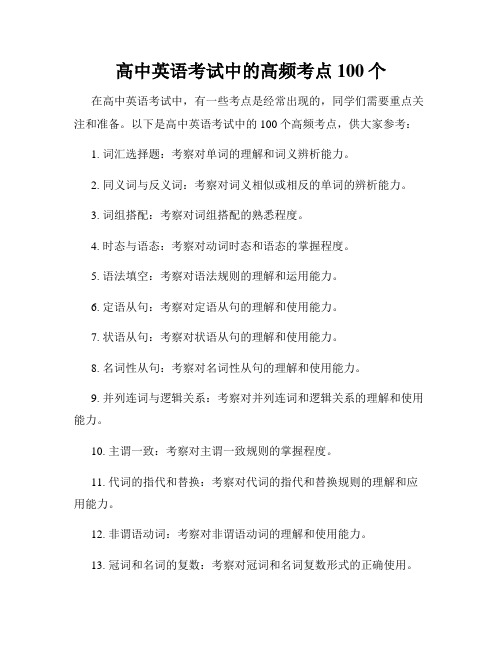
高中英语考试中的高频考点100个在高中英语考试中,有一些考点是经常出现的,同学们需要重点关注和准备。
以下是高中英语考试中的100个高频考点,供大家参考:1. 词汇选择题:考察对单词的理解和词义辨析能力。
2. 同义词与反义词:考察对词义相似或相反的单词的辨析能力。
3. 词组搭配:考察对词组搭配的熟悉程度。
4. 时态与语态:考察对动词时态和语态的掌握程度。
5. 语法填空:考察对语法规则的理解和运用能力。
6. 定语从句:考察对定语从句的理解和使用能力。
7. 状语从句:考察对状语从句的理解和使用能力。
8. 名词性从句:考察对名词性从句的理解和使用能力。
9. 并列连词与逻辑关系:考察对并列连词和逻辑关系的理解和使用能力。
10. 主谓一致:考察对主谓一致规则的掌握程度。
11. 代词的指代和替换:考察对代词的指代和替换规则的理解和应用能力。
12. 非谓语动词:考察对非谓语动词的理解和使用能力。
13. 冠词和名词的复数:考察对冠词和名词复数形式的正确使用。
14. 动词的时态和语态:考察对动词时态和语态的正确运用能力。
15. 形容词和副词的比较级和最高级:考察对形容词和副词比较级和最高级形式的正确使用。
16. 物主代词和反身代词:考察对物主代词和反身代词的正确使用。
17. 动词的不定式和动名词:考察对动词不定式和动词的正确使用。
18. 平行结构:考察对平行结构的理解和运用能力。
19. 固定搭配:考察对固定搭配的熟悉程度。
20. 情态动词和虚拟语气:考察对情态动词和虚拟语气的正确使用。
21. 名词的所有格:考察对名词所有格的正确使用。
22. 倒装句:考察对倒装句的理解和使用能力。
23. 宾语从句:考察对宾语从句的理解和使用能力。
24. 动词短语和介词短语:考察对动词短语和介词短语的理解和使用能力。
25. 含有从句的复合句:考察对含有从句的复合句结构的理解和使用能力。
26. 非限制性定语从句和强调句:考察对非限制性定语从句和强调句的理解和使用能力。
- 1、下载文档前请自行甄别文档内容的完整性,平台不提供额外的编辑、内容补充、找答案等附加服务。
- 2、"仅部分预览"的文档,不可在线预览部分如存在完整性等问题,可反馈申请退款(可完整预览的文档不适用该条件!)。
- 3、如文档侵犯您的权益,请联系客服反馈,我们会尽快为您处理(人工客服工作时间:9:00-18:30)。
高考英语高频考点专题专题一定语从句一、关系代词引导的定语从句1、that 指人或物在从句中作主语,宾语或表语which 指物在从句中作主语,宾语或表语(作宾语时可以省略)who 指人在从句中作主语,宾语或表语whom 指人在从句中作宾语whose 指人或物在从句中作定语as 指人或物在从句中作主语,宾语或表语but 指人或物在从句中作主语,宾语或表语注意:指物时,whose+名词=the+名词+of which 或of which+the+名词2、as 的用法(1)常用于下列结构:such…as; so…as;the same…as; as…as注意:the same…as 表示同一类,不同一个the same…that 表示同一个(2)as与which的区别a、位置不同as可放在主句后,主句前或主句中间;which只能放在主句后。
b、as起连接作用,表达说话人的观点、看法,并指出主句内容的根据或出处,意为“正如,正像”。
Which相当于并列句,可以用and this来代替,意为“这一点,这件事’”。
注意:as常用于下列结构:as we know/ as is known to all, as we all can see, as has been said before/above,as might be excepted, as is often the case, 一般不能用which代替as。
C、在从句中作主语时,which既可作系动词be的主语也可作实义动词的主语,而as只可作系动词be的主语。
3、but用作关系代词,相当于who/that…not例:In China there is no one but knows Lei Feng.二、只用that不用which的情况1、.先行词为all , much, everything, nothing , something ,anything, nothing, none, the one等不定代词时2、先行词被only, any, few, little, no , all, just , very ,right等修饰时.3、当先行词是最高级或被形容词最高级修饰时。
4、当先行词是序数词或被序数词修饰时。
5、当先行词是数词时.6、当先行词既指人又指物时。
7、如有两个定语从句,其中一个关系代词已用which,另一个关系代词则宜用that。
8、主句是There be结构,修饰其主语的定语从句宜用that 作关系代词。
9、被修饰成分为表语,或者关系代词本身是定语从句的表语时,该关系代词宜用that。
10、先行词为what,关系代词用that。
11、有时为了避免重复而使用that引导定语从句。
三、只用which不用that的情况1、当介词放在关系代词之前时。
2、在非限制性定语从句中。
3、当关系代词指整个主句的概念时。
四、只用who不用that的情况1、当先行词是one, ones,anyone或those时。
2、there be 结构中。
3、当先行词是人,后面有较长修饰语时。
4、为了避免重复或引起歧义。
5、当先行词是I,you,he,they等时(常用于谚语中)。
6、先行词是指成员的集体名词。
7、who可以引导非限制性定语从句。
8、先行词是拟人化的名词。
9、先行词指特定的人时用who,不指特定的人用that。
五、关系副词引导的定语从句1、when 时间状语注意:It/Ihis/That + be + the first/ second/ last time that… 只能用that,that可以省略,从句用相应的完成时。
2、where 地点状语注意:当先行词为模糊的地点时,如point. Situation, case, position, stage, scene, spot, activity, family, job等名词时用where.3、why 原因状语先行词为reason。
六、介词与关系代词1、介词如何确定(1)依据定语从句中动词的习惯搭配来确定(2)依据先行词的习惯搭配来确定(3)根据意思来确定(4)为了强调某一名词,不定式前加上关系词2、关系代词作介词的宾语时,介词的位置(1)whom和which可以和介词一起放在先行词和从句之间,也可以把介词放在从句中有关动词的后面。
(2)含有介词的短语动词一般不拆开,介词仍放在动词的后面。
(3)关系代词that在从句中作介词宾语时,介词不能放在它的前面,只能放在从句中有关动词的后面。
(4)关系代词whose也可以在从句中与它所修饰的名词一起作介词宾语。
3、“名词/数词/代词+介词+关系代词”结构常见的形式有:名词/one/two/some/none/all/both/several/many/most/a few/a little/the+比较级/the+最高级…+of+which/whom。
七、定语从句中的主谓一致1、关系代词作从句的主语时,从句中谓语动词的人称和数要与先行词保持一致,先行词是句子时,从句的谓语动词用单数形式。
2、“one of+复数名词”位于关系代词前作先行词时,关系代词在从句中作主语,从句的动词通常用复数,但当one前有the,the only,the very等修饰时,从句的谓语动词要用单数。
八、注意way和time后接定语从句的情况1、当先行词是way,且意为“方式、方法”时,引导定语从句的关系词有下列三种形式:that/in which/不填。
注意:关系词在从句中必须作状语。
如果关系词在从句中作主语或宾语,按正常的定语从句分析。
2、当先行词是time时,若time作“次数”讲,应用that引导定语从句,that可省略;若time作“一段时间”讲,应用关系副词when或介词at/during+which引导定语从句。
专题二状语从句一、时间状语从句1、when的用法(1)when既可引导一个持续性动作,也可引导一个短暂性动作,可用于表示主句和从句动作同时发生或从句动作先于主句动作,有时还可表示从句动作后于主句,意为“当。
时候”。
(2)when在be about to do。
when。
,be doing。
when。
,had done。
when。
,be on one’s way。
when。
,be on the point of doing。
when。
等结构中,作“那时突然”讲。
(3)when “既然、鉴于;尽管,虽然(位于主句之后);如果”2、while的用法(1)表示“当。
时候”,引导的动作必须是延续性的。
(2)用作并列连词,表示相对关系“然而”。
(3)引导让步状语从句,相当于although,意为“虽然”,位于主句前。
(4)引导条件状语从句,相当于as/so long as,意为“只要”。
3、as 的用法(1)表示“当。
时候”,强调同时发生,不指先后。
(2)说明两种正在发展或变化的情况,表示“随着”,表示时间的推移。
(3)表示“一边。
一边。
”。
(4)强调两个动作紧接着发生。
(5)表示“虽然,尽管”。
(6)其他含义“正如,正像”,“作为”,“由于,因为”。
4、before的用法(1)一般意为“在。
之前”“。
才”,“。
就”“还没有。
”“免得”“不知不觉”“宁可,宁愿”,“否则,要不然”。
(2)It + will be/was + 时间段+before+一般现在时/一般过去时。
在肯定句中,意为“多长时间之后才”;在否定句中,意为“用不了多长时间就”。
5、until和till(1)与肯定句连用,必须是延续性动词。
(2)与否定句连用,必须是非延续性动词,表示“直到。
才,在。
之前不。
”。
注意:not until可用于强调句和倒装句强调句:It is/was not until…that…倒装句:not until 放句首时,主句要部分倒装。
6、since的用法(1)since后是非延续性动词,时间起点从该动作发生算起,意为“做某事多久了”;since后是延续性动词,时间起点从该动作结束算起,意为“不做某事已有多长时间”。
(2)It is/has been +时间段+since+一般过去时7、表示“一。
就。
”的句型(1)as soon as, once,immediately,directly,instantly,the moment,the minute等引导的从句都表示从句的动作一发生,主句的动作随即发生,常译作“一。
就。
”,这类从句中,经常用一般现在时态代替将来时态。
(2)on doing sth.或“on one’s+名词”作时间状语。
8、有些名词和副词可以起连接词的作用,引导时间状语从句。
注意:时间状语从句中不用将来时态。
若要表示将来时间,可用一般现在时态表示。
但when 引导名词性从句时,从句中要使用将来时。
二、地点状语从句1、地点状语从句由where,wherever引导。
注意:where与where的区别:Where表特定的地点,而wherever表示非特定的地点。
Wherever=to/at any place where2、地点状语从句与定语从句的区别Where引导定语从句时,从句前应有一个表示地点的名词作先行词;而状语从句前则无先行词。
三、原因状语从句引导词:because, since,as, now that, not that…, but that…, seeing that, considering that, in that注意:for也可以表示原因,属并列连词,但不是说明直接原因,而是对某种情况加以推断,用于表示补充说明理由。
四、目的状语从句引导词:so, so that, in order that, that, to the end that(以便,为了),in case,for fear that,lest(以免,以防),目的状语从句中通常有情态动词can,could,may,might,should,would等。
注意:1、in case 还可表示“万一,假如”。
2、目的状语从句可以用so as to, in order to 等不定式代替,但主句和从句的主语必须一致。
五、结果状语从句引导词:so...that(如此。
以至于。
),such...that(如此。
以至于。
),so that(结果是),with the result that(所以,结果是)注意:(1)so...that与such...that的区别So+形容词such+a/an+形容词+单数名词So+形容词+a/an+单数名词such+形容词+复数名词So+副词such+形容词+不可数名词So many/few+复数名词So much/little+不可数名词(2)so that引导的目的状语从句与so that 引导的结果状语从句目的状语从句一般使用情态动词,结果状语从句一般不使用情态动词;结果状语从句常常用逗号与主句分开。
